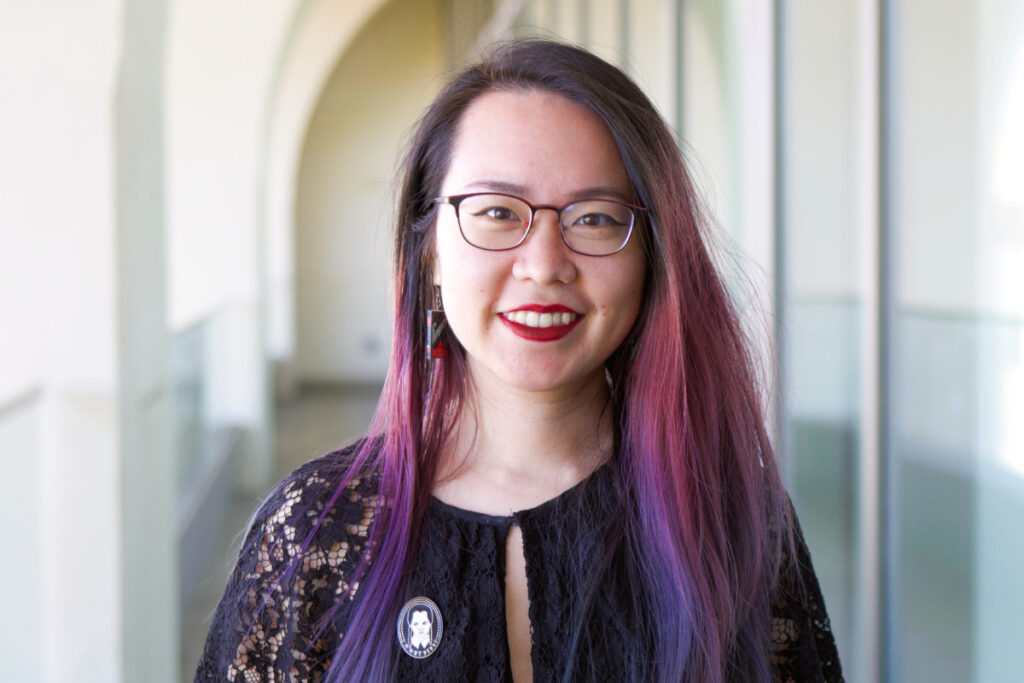This is the third post in a series of interviews conducted by the Woodruff Library with the 2019-2020 Emory Libraries/Emory Center for Digital Scholarship (ECDS) Fellows. Funded by the Laney Graduate School, the library and ECDS award fellowships to advanced graduate students expecting to complete their dissertations by the end of the fellowship period. Fellows are placed within the Woodruff Library, Rose Library and ECDS to work in an area related to their subject specialization or interest, culminating in a formal presentation in the spring.
Tell us a little bit about yourself. Where are you from? What’s your favorite book? What’s your favorite thing about Emory/Atlanta?
I am a sixth-year Ph.D. candidate in English at Emory, with a primary focus on science fiction literature and media. I grew up in Ithaca, NY, where I also went to college (Cornell University). People who know me will see this answer coming from a mile away, but my favorite book is Mary Shelley’s Frankenstein; or, the Modern Prometheus (1818), which I re-read at least once per year.
My favorite thing about Atlanta is that the winter weather is so much warmer than Ithaca’s! Growing up in Central/Upstate New York, I had to wear garishly large, puffy snow pants to school. (It was not a good look for me.)
What are you researching for your dissertation?
The title of my dissertation project is “A Future for Hopeful Monsters: Gender, Disability, Race, and Embodiment in Science Fiction.” Each chapter explores the intersections of identity and representation as portrayed in science fiction literature and media. Beginning with Frankenstein, I analyze shifting conceptions of monstrosity, from the monster’s status in the medieval era as an omen demonstrating a societal ill, to its usage in early anatomy—when genetically “deformed” babies were diagnosed “monsters” in scientific texts—to one of its most famous incarnations, Frankenstein’s creature. In the second chapter, I explore variations on the female monster in such guises as the gynoid (female robot—did you know that android technically denotes a masculine/man-like robot?) in Ex Machina and female clones in Orphan Black (my favorite science fiction show).
The next chapter analyzes William Gibson’s cyberpunk short stories, and I theorize the “crip cyborg” (a cyborg that knowingly plays upon both their physical disability, prosthetic technologies, and social stigmas associated with disability). I am currently researching material for my fourth chapter on race and technology in such films as Get Out.
What interested you about the Woodruff Library Fellowship?
After passing comprehensive exams, I began working at the ECDS through their fantastic graduate student internship program; I was and am still excited to learn new technical skills (such as audio editing and digital storytelling), and also sought to engage in digital scholarship, which spans a diverse array of disciplines and projects. What drew me to the Digital Humanities fellowship, in particular, was the opportunity to learn about digitization and to continue honing my social media/digital publishing skills with the open-access journal Atlanta Studies. In addition, I get to continue working with the wonderful staff at the ECDS, and meet with great library folks in general.
What will you be working on this year for your Woodruff Library Fellowship?
I will be learning the ins and outs of digitization with the aid of my fellowship sponsor, Jesse Karlsberg. I have just initiated a project to digitize fanzines from the Atlanta Punk Periodical Collection at Rose Library, about which I am very excited. These zines give a unique insight into the local Atlanta punk/hardcore scene of the 80s, and as a fellow zine-maker/fan of punk and alternative culture, I am interested in helping to preserve the spirit of the subculture.
In conjunction with Rebecca McGlynn (the 2019-2020 Research and Engagement fellow) I will be working with the Atlanta Daily World photograph collection at Rose Library; we hope to digitize some of this important archive’s materials, making them accessible to a general audience and available for classroom engagement.
I have also pitched a project to interview and write about various people involved with science fiction in Atlanta—including professors, librarians, nonprofit organizers, and stunt-people—to be submitted as a blog article series for Atlanta Studies.
Finally, in my role as Associate Editor of Atlanta Studies I will be helping with publishing, overseeing website updates, and reassessing the journal’s social media presence to best highlight the diverse and interdisciplinary work it features.


